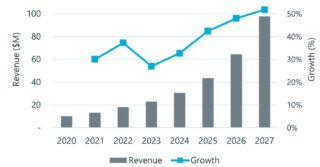Future CO2 regulations for transporting goods and gaining access to urban areas are reshaping the logistics ecosystem significantly. Professional customers are already experiencing growing cost pressures and a demand for safer, fully connected electric vehicles in their operations.
By 2030, the european market for electrified vans is projected to triple in size, creating a substantial opportunity for the introduction of a new range of Light Commercial Vehicles (LCVs). Renault Group, Volvo Group, and CMA CGM are taking common collaboration to spearhead and dominate the emerging market for fully electric vans and associated services.
Renault Group and Volvo Group have signed binding agreements to establish a new company, where they will initially each have 50-50 equity stakes. They are planning to invest EUR 300 million each over the next three years to support this endeavor. Whereas CMA CGM Group has signed a non-binding letter of intent to participate in the new company and will invest EUR 120 million through its PULSE Energy Fund, which is dedicated to accelerating the decarbonization of the transport and logistics sectors.
The establishment of the new company is anticipated in early 2024 and is contingent on the successful completion of all regulatory approval processes. This future entity is expected to operate under its own distinct corporate identity and will be headquartered in France.
The vehicles will be constructed on a cutting-edge fully electric Light Commercial Vehicle (LCV) skateboard platform, offering a high degree of modularity for various body types at an affordable cost while meeting rigorous safety standards.
By adopting the new Software Defined Vehicle architecture, these vehicles will have unparalleled capabilities for monitoring delivery activities and enhancing user business performance. This will result in a 30% reduction in the overall cost of usage for logistics companies.
The connected services enabled by the software-defined vehicle technology will ensure that customers have access to up-to-date vehicle capabilities throughout their vehicle’s lifespan. The van will feature exceptional urban mobility, versatility for customized solutions, various battery capacities, and an innovative 800V feature for vans.
Volvo Group and Renault Group will remain competitors in all other areas.


![Forecasts, Opportunities, and Challenges for the Polish Industry in 2024 [ANALYSIS] Forecasts, Opportunities, and Challenges for the Polish Industry in 2024 [ANALYSIS]](https://industryinsider.eu/wp-content/uploads/xIndustry-40-320x167.jpg.pagespeed.ic.o8zijDQlIJ.jpg)
![The importance of artificial intelligence in transport and automotive industry is growing [REPORT] The importance of artificial intelligence in transport and automotive industry is growing [REPORT]](https://industryinsider.eu/wp-content/uploads/xcity-320x167.jpeg.pagespeed.ic.xFkQdk7qXO.jpg)
![By 2030, the market size of metal processing tools is expected to reach $120.44 billion [REPORT] By 2030, the market size of metal processing tools is expected to reach $120.44 billion [REPORT]](https://industryinsider.eu/wp-content/uploads/xcutting-tools-320x167.jpg.pagespeed.ic.SgnEk-RWA-.jpg)
![Methane emissions remains elusive challenge for oil and gas industry [REPORT] Methane emissions remains elusive challenge for oil and gas industry [REPORT]](https://industryinsider.eu/wp-content/uploads/xMethane-emissions-by-source-320x167.jpg.pagespeed.ic.q-7jG2luXb.jpg)

![Will digital twin revolutionize the aerospace and defense sector? [REPORT] Will digital twin revolutionize the aerospace and defense sector? [REPORT]](https://industryinsider.eu/wp-content/uploads/xdigital-twin-in-aerospace-320x167.jpg.pagespeed.ic.K-YNPhggcS.jpg)